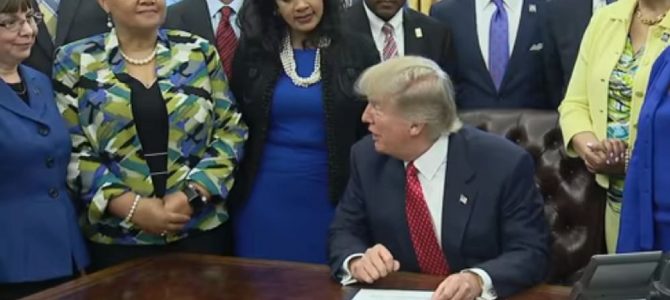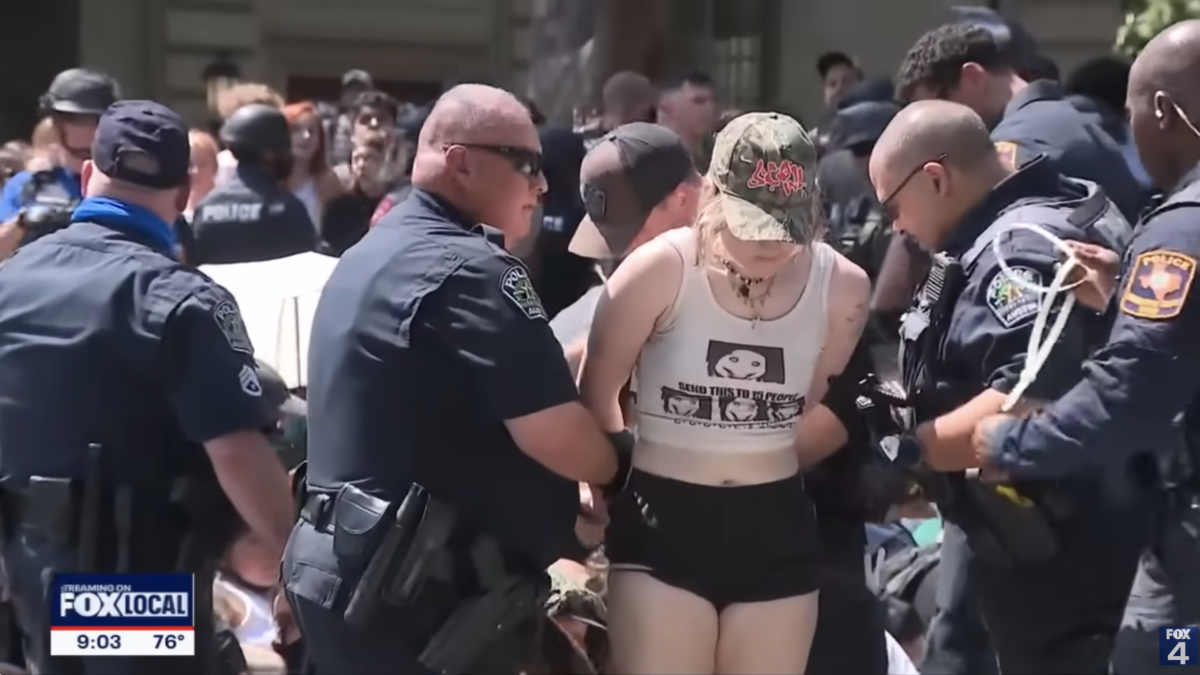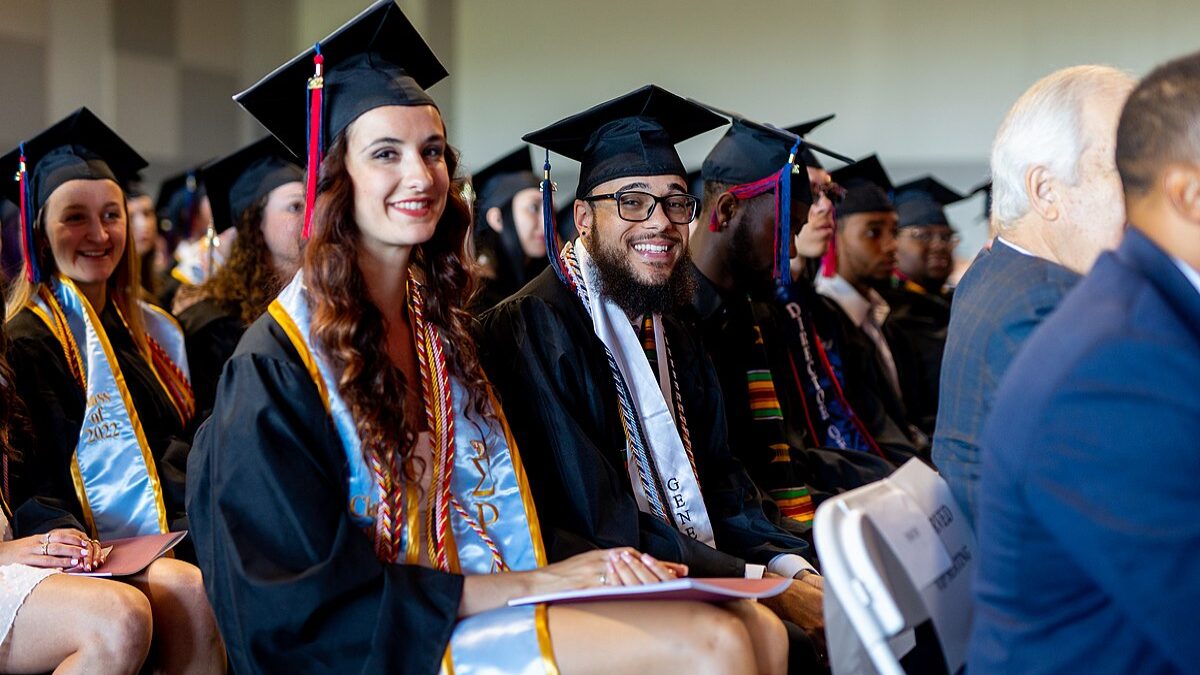
It’s been rough for Education Secretary Betsy DeVos in her first few weeks on the job. In her first week she had to be hustled away by security after protesters blocked her from visiting a public middle school then pursued her down an alley, and was lambasted on Twitter by DC’s former schools chancellor. The head of the nation’s largest teachers union took to the press rather than a return phone call to attack DeVos’s attempts at cross-aisle outreach.
Then DeVos fought against President Trump and Attorney General Jeff Sessions in a failed attempt to retain President Obama’s lawless rewrite of Title IX that forced the nation’s public schools to open private facilities to all students regardless of biology or plumbing.
In advance of Trump’s state of the union Tuesday, DeVos met with leaders of historically black higher education institutions (HBCUs). Afterward, she released a conventional PR statement:
A key priority for this administration is to help develop opportunities for communities that are often the most underserved. Rather than focus solely on funding, we must be willing to make the tangible, structural reforms that will allow students to reach their full potential.
Historically Black Colleges and Universities (HBCUs) have done this since their founding. They started from the fact that there were too many students in America who did not have equal access to education. They saw that the system wasn’t working, that there was an absence of opportunity, so they took it upon themselves to provide the solution.
HBCUs are real pioneers when it comes to school choice. They are living proof that when more options are provided to students, they are afforded greater access and greater quality. Their success has shown that more options help students flourish.
This basic stuff deeply offended some folks. Politico published a typical heavy-breathing piece about how “Some experts on historically black institutions panned the statement as ignorant, while others said she was inadvertently praising segregation.” The Politico writeup linked renowned black history expert Sen. Claire McCaskill:
Totally nuts. DeVos pretending that establishment of historically black colleges was about choice not racism. https://t.co/gROpItxRx4
— Claire McCaskill (@clairecmc) February 28, 2017
The Leadership Conference, a coalition of about 200 organizations that are predominantly liberal (like the ACLU, AFL-CIO, Children’s Defense Fund, Evangelical Lutheran Church of America, GLSEN, Human Rights Campaign, NAACP, National Center for Transgender Equality, etc.) released a huffy response from president Wade Henderson:
HBCUs were created in response to a racist system of segregation that saw the education of black people as a threat to white supremacy – a belief central to slavery — and that refused to allow black people to participate in the education system available only to white people. HBCUs continue to play an important role in our education system.
There is no shortage of academic literature on this subject, including the seminal work, Education of Blacks in the South: 1860-1935, by noted historian James Anderson. I would advise Secretary DeVos to check the facts, study the history, and refrain from suggesting that Jim Crow was about choice for anybody besides segregationist politicians.
Henderson wasn’t the only one who seethed at DeVos’s praise for black Americans’ constructive, self-liberating response to injustice. Alexandra Petri at the Washington Post wrote the following unhinged response (emphasis original): “Does [DeVos] mean choice in the sense that, if these institutions had not been pioneers during the era of racial segregation, black students would have had the choice to go to school or go nowhere? Does she not know what the word ‘choice’ means?”
Oh, she goes further.
If this is the kind of school choice that DeVos is hoping to bring nationwide, we are up a worse creek than previously thought. By this broad definition, ‘tangible, structural reforms that will allow students to reach their full potential’ sound like they could include ‘restoring segregation to the land.’ After all, it was segregation that created this wonderful pioneering set of school choices in the first place.
… Internment was just a lovely way of providing more housing options to people. Before, U.S. citizens and noncitizens of Japanese descent did not have the option of moving to a cool gated community with a watchtower and barbed wire fences, but, afterwards, they did. Similarly, with the Indian Removal Act, President Andrew Jackson created a whole range of options for many communities. Instead of the option of staying in the place where they lived, they had the option of — moving! With help from the U.S. Cavalry.
This was clearly the essence of Jim Crow laws: giving people a greater range of options. Without Jim Crow laws, there would only have been one set of water fountains for everyone…With Betsy DeVos in charge, soon you may have the wonderful option of not sending your child to any school at all.
What the flying petunias, lady. It shows terribly bad faith to dogwhistle a woman’s support for institutions that met needs of minority Americans into an implied agenda of turning American schools into Japanese internment camps and Indian reservations. It’s even more ridiculous given that DeVos is a woman who in 2006 threw her heavy political weight against a proposal to eliminate racial preferences in college admissions and government hiring. Say “choice” and some people hear “ethnic cleansing,” I guess. Has postmodernism really brought us to this already?
What Does Choice Mean, Really
At a surface level this manufactured spat is about the meanings of a few basic words. Politico quoted an HBCU president, Austin Lane, whose response encapsulated the disconnect: “HBCUs were created for African-Americans because they had no choice and were unable to attend schools due to segregation laws.” His is the polite version of the argument (such as it is) Petri advanced: moving from no choice to one choice is not really a choice.
Logically, that’s false. There’s a true difference between, say, being banned from all grocery stores to being banned from all but one grocery store. You’ve moved from no choice to one choice (or another choice if you take growing your own food or bartering into account, which people can and did do for education as well). It’s limited, but it’s distinct from nothing. By the way, this argument is a backhanded slap against HBCUs and their K-12 counterparts. It essentially says “They were better than nothing, but not much.”
Also, in context this critique doesn’t even apply: since the inception of higher education people have always traveled for it. If there is more than one HBCU — in fact there are 107, several established before the Civil War, in addition to non-HBCU colleges like my alma mater, Hillsdale, that never practiced racial discrimination — then you instantly have plural options. Not none or one but many. We’ve moved from no choice to many choices, thanks to entirely voluntary efforts and despite government-mandated segregation. Which is precisely DeVos’s point.
Second, there is a real distinction between forced action and inaction. There is not a choice equivalency between the federal government forcing any group of people to live in a certain area and people voluntarily creating institutions for educating children and neighbors who elect to attend.
To make Petri’s analogy work it would make more sense to compare internment to compulsory school attendance laws. FDR forced Japanese Americans to live in certain camps; state governments force children (with some loopholes) to attend specific public schools. Obviously there’s a major degree difference between forcing school attendance and forcing internment, but I’m just talking about the fact that forced action is, definitionally, not voluntary action. It’s the opposite. If you’re forced, it’s not a choice. If it’s a choice, it’s not forced. Capiche?
The Root of this Kerfuffle Is Power
But this all is far less about word choice than the education establishment’s resistance to the ideas DeVos embodies, which threatens their control over education and politics, on several fronts. What really offends them is not that DeVos said historically black institutions offer options to children who would otherwise have fewer, but that the Trump administration’s outreach to African-American families threatens Democrats’ undeserved political monopoly on the black vote and its massive take from teachers unions, which in many states teachers must join to be allowed a public-school job.
As I’ve written before, the leadership of self-described black advocacy organizations, including Black Lives Matter, is woefully out of step with the desires of the constituents they claim: “In a 2015 poll conducted by the Black Alliance for Educational Options in Alabama, Louisiana, New Jersey, and Tennessee, majorities of black Americans supported charters, typically by approximately two-thirds.”
In a nationally representative 2016 poll, 74 percent of black Americans supported charter schools; only 25 percent said a public school is their first choice for their child, if they could choose among public, private, charter, or homeschooling. Sixty-one percent support school vouchers, and 63 percent supported tax-credit scholarships (a form of voucher funded entirely privately rather than using government money). Forty-nine percent, a plurality, think public education is “on the wrong track.”
School-choice policies threaten Democrats’ political monopoly because their political coalition depends on union money and organizing. And unions (nowadays) hate vouchers. (Expect that to change if vouchers become more widespread, however. To survive unions will switch to capturing vouchers to serve their interests, as they already have with charter schools.) But obviously a lot of black people don’t. That’s not a new thing, either.
Alright, Let’s Everyone Get Educated
It’s less clear DeVos is “woefully undereducated” about HBCUs than that self-proclaimed black leaders are hiding their own community’s history to maintain an easier grip on political power. Black and progressive Americans have long supported school-choice policies such as vouchers specifically because the public schools many racial minorities are required to attend are cesspools of violent ignorance, and have remained so for decades despite a parade of cynical politicans — of all races — making careers and moolah by exploiting kids’ misery.
For example, longtime civil rights activist Howard Fuller, a child of sharecroppers who attended Malcolm X speeches and later founded Malcolm X Liberation University, was a key figure in passing one of the first modern school choice programs in America, Milwaukee’s vouchers. He also helped found the Black Alliance for Educational Options, which supports DeVos’s choice stance. Back when his most recent book came out in 2014, he told me in an interview why:
I use the term parent choice. It’s not an issue of schools choosing, it’s an issue of parents choosing. I don’t think you ought to have an America where those of us with money have the opportunity to choose the best environment for their children. If you have money in America, you have choice. Because if schools don’t work for your children, you’re going to move, you’re going to get those kids into another private school, you’re going to get tutoring, or all three. Low-income and working-class parents don’t have the opportunity to do it. For me it’s a social justice issue, not about free markets — trying to ensure that those families that have the least among us have some opportunity to choose the best environment for their children.
Other progressives and black Americans have supported school vouchers for decades, not that Democrats want you to know that. That would require them to do some explaining to minority voters they currently rake in easily.
Read through RedefinED’s blog series on this. The latest post explains President Jimmy Carter’s support for vouchers, which evaporated, along with his party’s, when he had to lean on the National Education Association to eke out his presidential win. Ever since, Democrat politicians have opposed vouchers despite the desire for it among many of their constituents, simply because unions understand and fight for their interests better than many voters do.
Trump and DeVos could change that. That’s what their detractors on the Left are really scared of.








